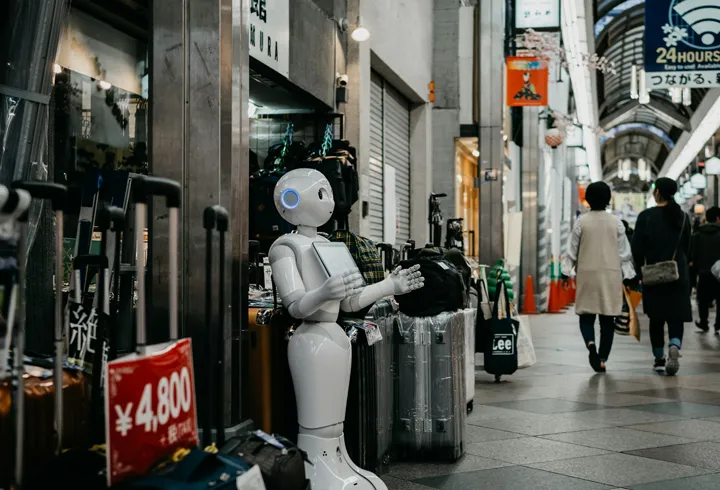Rather than fearing technologies, let us champion cooperation where human gifts and AI’s analytical talents synergize. Already, intelligent systems discreetly streamline tasks, enabling focus on strategic thinking and caring relationships elevating lives.
Yet AI’s true empowerment emerges not from singular advantages, but how augmented partnerships dissolve obstacles across spheres. Insights illuminate options to leverage AI, while empathy and wisdom guide advances experienced meaningfully by all.
Immersing diverse strengths through prudent design uplifts candidates and innovations reflecting communities served. Together, may we safeguard humanity’s essence of dignity and purpose amid exploration, upholding each role through understanding.
In solidarity, potentials flourish without restriction. Data enlightens equitable choices promoting abilities, as care remains our North Star. Progress stems not from isolated functions, but from shared commitment dissolving divisive legacies one cooperative stride at a time.
With open-minded trust, machines complement without dominating humanity’s essence – our capacity for compassion cultivating potentials wherever they emerge. Through cooperative spirit, leveraging AI serves as a provident ally nurturing dreams of a just future accessed participatory.
Our technologies follow the ethos we exemplify. May continued partnership ensure tools always honor the inherent worth and perpetuate betterment accessible to all?
Understanding AI’s Role and Limitations
- What AI excels at (pattern recognition, data processing, etc.)
- AI can rapidly process vast amounts of data to identify patterns, trends, and insights that would be impractical for humans
- Machine learning algorithms are adept at tasks like image/speech recognition, language translation, predictive analytics
- Example: Leveraging AI to analyze medical images and patient data to support disease diagnosis
- Where human cognition is superior (judgment, ethics, creativity)
- Humans possess reasoning, emotional intelligence, and the ability to apply contextual judgment that AI lacks
- Creative, unstructured tasks and subjective decision-making still require the human mind
- Example: Evaluating ethical implications and real-world context when AI makes a consequential recommendation
- Avoiding AI bias and the “black box” problem
- AI systems can perpetuate human biases present in training data or reflect biases of their creators
- Many AI models are opaque “black boxes” making their decisions difficult to interpret or audit
- Addressing bias through diverse data, human oversight; and increasing transparency with emerging techniques
A. Integrating AI as a Decision Support Tool
- Use Gen AI for information filtering and insight generation
- AI can sift through and make sense of massive datasets to surface relevant information
- It can identify hidden patterns, correlations, and predictive insights to inform decision-making
- Example: AI parsing consumer data, and market trends to recommend new product/service opportunities
- Empowering human decision-makers with AI-powered intelligence
- AI should augment and support human judgment, not replace it entirely
- Feeding AI-generated insights, forecasts, and recommendations to human experts for evaluation
- Example: AI flagging high-risk loan applicants, but humans make the final approval decision
- Case studies: Leverage AI in healthcare, finance, customer service
- Healthcare: Leveraging AI for medical imaging, risk stratification, clinical decision support
- Finance: Leveraging AI for credit scoring, fraud detection, stock trading strategy
- Customer service: Leveraging AI chatbots for automated customer interactions
B. Cultivating Human-AI Collaboration
- Defining roles and responsibilities for humans and machines
- Precisely scoping tasks/processes where AI leads vs. where human judgment is essential
- Establishing clear policies and controls around AI’s boundaries of operation
- Training and change management for the human workforce
- Upskilling personnel to work seamlessly with AI systems
- Fostering trust and adoption through transparency on AI’s capabilities and limitations
- Governing AI through ethical frameworks and oversight
- Implementing AI ethics guidelines, risk management, and compliance processes
- Human monitoring, auditing, and the ability to override AI decisions if needed
C. Managing AI Risks and Failures
- Monitoring and auditing AI systems
- Continuous monitoring of AI performance and outputs to detect errors or drift
- Auditing AI decisions, especially in high-stakes domains like healthcare and finance
- Contingency planning and human backstops
- Fallback plans if AI systems fail or output erroneous results
- Maintaining human oversight and the ability to take over critical processes
- Responsible AI development and deployment
- Adopting secure software practices tailored for AI model development and deployment
- Testing AI systems rigorously before production use for safety and reliability
More on Leveraging AI without Losing Human Judgement
The rapid pace of AI development means businesses must continuously reevaluate their AI strategies and preparedness. A growing area of focus is leveraging AI governance – establishing policies, controls, and monitoring mechanisms to manage AI risks around privacy, security, fairness, transparency and accountability.
Another emerging trend is the rise of “Ethical AI” principles and frameworks aimed at instilling human values like beneficence, non-maleficence, dignity, freedom, justice and explicability into AI systems. Notable examples include the EU’s Ethics Guidelines for Trustworthy AI and the IEEE’s Ethically Aligned Design standards.
Looking ahead, Gartner predicts that through 2025, the demand for skilled AI professionals will grow to enable responsible and scalable AI practices within organizations. This talent gap underscores the vital role humans will continue to play in leveraging AI responsibly.
Leverage AI
Amid disruption, humanity’s gifts endure as we refine relationships with technologies. Together, may skills nurture one another – data enriching intuition, empathy steering insights towards outcomes uplifting lives.
AI excels where analysis simplifies complexities, yet progress stems from cooperative talents. Wisdom guides applications cultivated through understanding different strengths and backgrounds.
Collaborative problem-solving dissolves obstacles as roles complement without dominating. Insights emerge alongside dignity and purpose for all involved. Progress stems not from isolated functions, but synergizing potentials through respect.
Together, may we safeguard humanity’s essence – our capacity for compassion cultivating gifts wherever they emerge. Tools honor inherent worth as partnerships perpetuate betterment meaningfully experienced.
Cooperation unveils frontiers as AI discreetly optimizes workflows, empowering focus on caring relationships. Breakthroughs blossom from communal spirit informing advances uplifting communities served.
Our technologies exemplify the ethos we champion. With open-minded trust, may continued partnerships ensure tools always promote abilities and shape just systems accessible to all.





